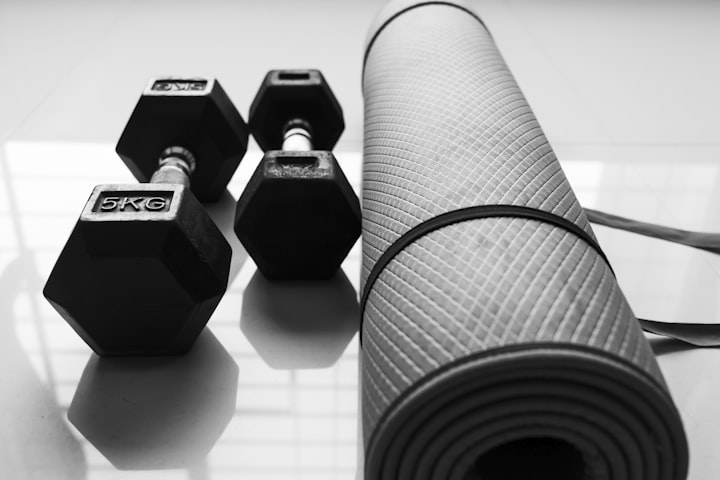Top 10 Tips to Crush Your Keto Goals
Read this article to learn more.

Are you new to the keto lifestyle and feeling overwhelmed? With so many tips and tricks for successful keto dieting, it can be difficult to know where to start. But don't worry! We've put together the top 10 tips to help you achieve your keto goals and get on the path to success. From meal planning to shopping smarter, these simple tips will help you stay on track and keep your keto diet in check. So, let's get started!
1) Understand the Basics of the Ketogenic Diet
Before you jump into the ketogenic lifestyle, it's important to understand the basics of the diet. Simply put, the ketogenic diet is a low-carb, high-fat diet that promotes ketosis - a metabolic state where the body burns fat for fuel instead of glucose.
The goal of the diet is to achieve a state of ketosis, where the body starts producing ketones. Ketones are molecules that the body can use for energy when glucose is in short supply. When you restrict your carbohydrate intake, your body is forced to burn fat for fuel, which leads to weight loss and other health benefits.
It's important to note that the ketogenic diet is not just about eating bacon and butter all day. The key to success is eating the right types of fat, protein, and carbohydrates. Generally, the macronutrient breakdown of the diet is 70% fat, 25% protein, and 5% carbohydrates.
To achieve ketosis, it's recommended that you restrict your carbohydrate intake to no more than 50 grams per day, and some people may need to consume even fewer carbs to reach their goals.
Some examples of keto-friendly foods include fatty cuts of meat, avocados, nuts and seeds, low-carb vegetables like spinach and broccoli, and healthy oils like coconut oil and olive oil.
By understanding the basics of the ketogenic diet, you'll be better equipped to start your journey and set yourself up for success. Remember, the ketogenic lifestyle is not a fad diet, but a sustainable way of eating that can lead to numerous health benefits.
2) Calculate Your Macros and Stick to Them
One of the most important aspects of the ketogenic diet is ensuring that your body is receiving the proper amount of macronutrients, or “macros”. Macros refer to the three primary sources of nutrition that we consume in our diets: fat, protein, and carbohydrates. By calculating your macros, you can create a balanced and effective meal plan that supports your weight loss goals and keeps your body in a state of ketosis.
To determine your daily macronutrient goals, you can use a keto macro calculator. This tool takes into account factors such as your height, weight, activity level, and weight loss goals to provide you with personalized macro targets. Once you have calculated your macros, the next step is to plan your meals and snacks around them.
When it comes to tracking your macros, there are a number of helpful apps and online tools available. Some popular options include MyFitnessPal, Carb Manager, and Cronometer. These tools allow you to log your meals and track your daily intake of fats, proteins, and carbs. By consistently sticking to your macro goals, you can ensure that your body is receiving the proper nutrients and maintain a state of ketosis.
It’s important to note that calculating your macros is not a one-time task. As your body changes and adapts to the ketogenic diet, your macro needs may shift as well. Regularly re-calculating your macros and adjusting your meal plan accordingly can help you stay on track and continue making progress towards your goals.
In summary, calculating your macros and sticking to them is an essential part of success on the ketogenic diet. By tracking your intake of fats, proteins, and carbs and ensuring that you are meeting your daily macro goals, you can create a sustainable and effective meal plan that supports your weight loss goals.
3) Start with Simple, Whole Foods
When beginning your keto journey, it's essential to start with simple, whole foods. These are foods that are minimally processed and have no added sugars or chemicals. These types of foods will provide your body with the essential nutrients it needs to thrive while still helping you stay within your daily carbohydrate limit. Here are some examples of simple, whole foods to incorporate into your diet:
- Non-starchy vegetables like broccoli, cauliflower, spinach, and kale
- Proteins like chicken, beef, pork, and fish
- Healthy fats like avocado, nuts, and olive oil
- Dairy products like cheese and butter (in moderation)
By focusing on these types of foods, you can help keep your body in a state of ketosis while also feeling full and satisfied. It's also important to note that not all fruits and vegetables are created equal when it comes to keto. While some are high in carbohydrates, others are lower in carbs and can be enjoyed in moderation. Doing your research and keeping track of your carb intake can help you make informed decisions about what to eat.
Another benefit of starting with simple, whole foods is that it can help you save money on your grocery bill. Instead of relying on processed, pre-packaged foods that are often more expensive, you can choose ingredients that are more affordable and easier to find. This can be especially helpful if you're on a budget.
In summary, starting with simple, whole foods is an essential component of the keto diet. By focusing on nutrient-dense foods like vegetables, proteins, and healthy fats, you can help your body stay in ketosis while feeling satisfied and nourished. With a little planning and preparation, incorporating these foods into your diet can be both affordable and delicious.
4) Plan Your Meals and Snacks in Advance
One of the biggest challenges people face when starting a ketogenic diet is figuring out what to eat. The key is to plan your meals and snacks in advance to make sure you stay on track. This will help you avoid grabbing unhealthy options when you're hungry and pressed for time.
Start by figuring out your macros for the day and choosing foods that fit within those limits. Then, plan out your meals for the week and make a grocery list so you have everything you need on hand. Batch cooking can also be a lifesaver, so try to cook large meals on the weekends that you can portion out for the week.
When it comes to snacks, choose options that are high in fat and low in carbs. Nuts, seeds, cheese, and olives are all great choices. You can also prep snacks like keto-friendly protein balls or vegetable sticks with hummus to have on hand.
Remember, preparation is key to success on the ketogenic diet. By planning your meals and snacks in advance, you'll be able to stay on track and avoid temptations that could throw you off course.
5) Use Supplements to Support Your Goals
Incorporating supplements into your ketogenic diet can help you reach your goals faster and with more ease. Here are a few supplements to consider:
1. MCT Oil: Medium-chain triglycerides (MCT) are easily digestible fats that are quickly converted into ketones and used as fuel for your brain and muscles. Adding MCT oil to your coffee or smoothies can help you increase your energy and mental clarity.
2. Electrolytes: When you start a ketogenic diet, your body will lose electrolytes through urine as it adapts to using ketones instead of glucose for energy. You may experience symptoms such as headaches, muscle cramps, and fatigue if you don't replenish your electrolytes. Adding a pinch of Himalayan salt to your food or drinking an electrolyte drink can help.
3. Magnesium: Many people don't get enough magnesium from their diet, and this mineral is essential for muscle and nerve function. Magnesium also plays a role in regulating blood sugar levels, which can help you stay in ketosis. You can take magnesium supplements or incorporate magnesium-rich foods such as spinach, avocado, and almonds into your meals.
4. Digestive Enzymes: When you switch to a high-fat diet, your body may have trouble digesting and absorbing fats. Digestive enzymes can help break down fats and improve nutrient absorption.
Remember, supplements should not be used as a replacement for whole foods. Focus on getting most of your nutrients from nutrient-dense, whole foods, and use supplements to fill in the gaps. Consult with your healthcare provider before starting any new supplements.
6) Don't Be Afraid to Eat Fat
One of the biggest misconceptions about the ketogenic diet is that it promotes an unhealthy intake of fat. But in reality, a high-fat diet can be extremely beneficial for weight loss and overall health when done correctly.
The key to success on keto is to eat healthy fats, such as avocado, olive oil, nuts, and seeds, while avoiding unhealthy saturated and trans fats. Healthy fats are an important source of energy on keto, and they can help you feel fuller for longer periods of time, which can lead to less snacking and better weight loss results.
Additionally, fat is important for your body's absorption of certain vitamins, such as vitamins A, D, E, and K. So, don't be afraid to add some extra fat to your meals, whether it be by cooking with healthy oils or adding a dollop of grass-fed butter to your morning coffee.
Just remember, it's all about balance and moderation. Eating too much fat can hinder weight loss progress, so make sure to keep track of your daily intake and adjust as needed.
Overall, don't let the fear of fat hold you back from crushing your keto goals. Incorporate healthy fats into your meals and enjoy the many benefits of a high-fat, low-carb lifestyle.
7) Keep Track of Your Progress
One of the most important things to do when starting the keto diet is to keep track of your progress. This will not only help you see how far you've come, but also help you identify areas where you may need to make adjustments.
There are several ways to keep track of your progress, such as:
1. Take measurements: Track your weight, body fat percentage, and inches lost. This will give you a clearer picture of how your body is changing.
2. Keep a food journal: Write down everything you eat and drink, along with the macros and calories. This will help you stay on track with your macros and identify any patterns in your eating habits.
3. Use a tracking app: There are many apps available that allow you to track your food intake, macros, and exercise. Some popular options include MyFitnessPal, Carb Manager, and Cronometer.
4. Take progress photos: Take a photo of yourself every few weeks to visually see the changes in your body.
By keeping track of your progress, you'll be able to adjust your diet and exercise routine to better meet your goals. It's also a great way to stay motivated and celebrate your successes along the way. Remember, progress may be slow and steady, but it's important to keep pushing forward and never give up on your goals.
8) Stay Hydrated and Electrolyte Balanced
One of the most important aspects of a successful ketogenic diet is staying hydrated and maintaining electrolyte balance. When you first start the diet, your body will go through a transition period known as the keto flu. This can cause symptoms like headaches, muscle cramps, and fatigue. Many of these symptoms are due to a lack of water and electrolytes in your system.
To avoid the keto flu, make sure to drink plenty of water throughout the day. Aim for at least eight glasses a day, but increase your intake if you're sweating a lot or engaging in physical activity. You can also try adding some electrolytes to your water, like potassium, magnesium, and sodium. This will help replenish your body and prevent dehydration.
In addition to water, you can also hydrate with herbal tea, coffee, and bone broth. Just make sure to avoid sugary drinks and juices, as they'll kick you out of ketosis.
When it comes to electrolytes, you can get them naturally through foods like avocados, leafy greens, and nuts. However, you may need to supplement if you're experiencing symptoms like cramps, headaches, or heart palpitations. Talk to your doctor about which electrolyte supplements are right for you.
Remember, staying hydrated and balanced is essential to your success on the keto diet. By prioritizing your fluid and electrolyte intake, you'll feel better and have more energy to crush your goals.
9) Get Enough Sleep and Manage Stress
Sleep and stress management are two critical factors for success on the ketogenic diet. Lack of sleep and high levels of stress can both have negative impacts on weight loss, metabolism, and overall health.
To ensure you are getting enough sleep, aim for 7-9 hours each night and establish a consistent sleep routine. This may include creating a calming bedtime routine, avoiding electronic devices before bed, and keeping your bedroom cool and dark.
Stress can also derail your progress on the keto diet. Chronic stress can lead to increased cortisol levels, which can cause weight gain and hinder weight loss efforts. Managing stress can involve practicing relaxation techniques like yoga, meditation, or deep breathing exercises, or even simply engaging in activities you enjoy and finding time to relax.
Overall, prioritizing adequate sleep and managing stress levels can help support your body's ability to reach and maintain ketosis, making it easier to achieve your weight loss goals.
10) Find a Support System and Celebrate Your Successes
One of the keys to sticking to any diet or lifestyle change is having a support system in place. This is especially true for the keto diet, which can feel restrictive and difficult at times. So, how can you find a support system?
First, consider talking to friends or family members who are supportive of your goals. Let them know that you're starting a new lifestyle and ask if they can offer encouragement or join you on the journey. You may be surprised at how many people are willing to help.
If you don't have any friends or family members who are interested in keto, consider joining online communities or social media groups. There are plenty of people out there who are following the same diet and who can offer support and advice.
Finally, don't forget to celebrate your successes. Losing weight or sticking to your macros can be challenging, so it's important to acknowledge when you're doing well. Reward yourself with something non-food related, like a massage or a new piece of workout equipment.
Remember, keto is a lifestyle change, not a quick fix. It's important to have a support system in place and to celebrate your successes along the way. With these tips, you'll be well on your way to crushing your keto goals.
If you want to learn my #1 way to master the keto diet, click here now.





Comments
There are no comments for this story
Be the first to respond and start the conversation.